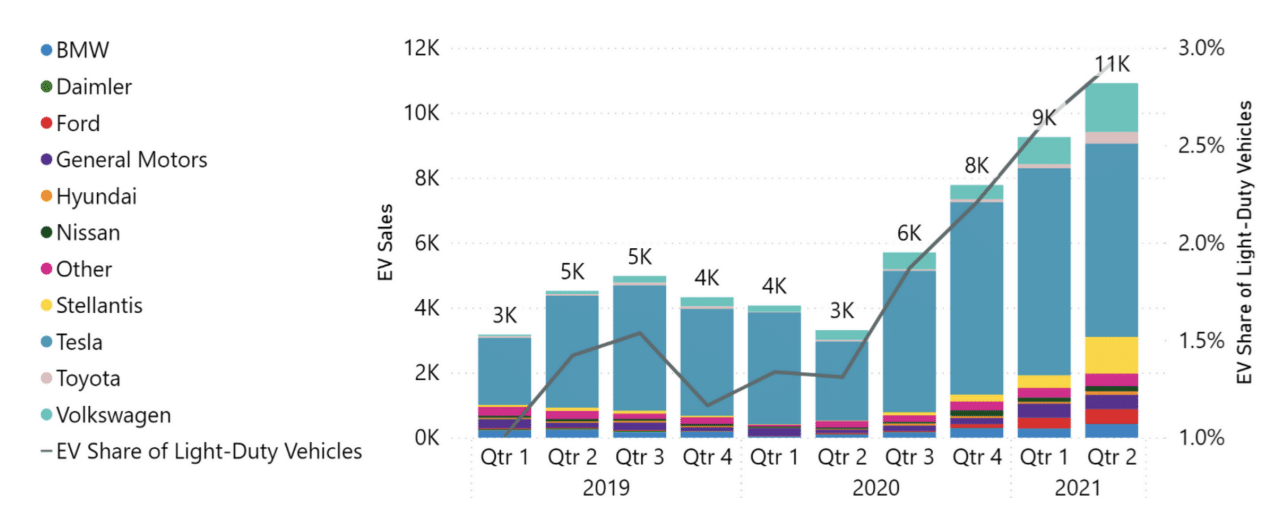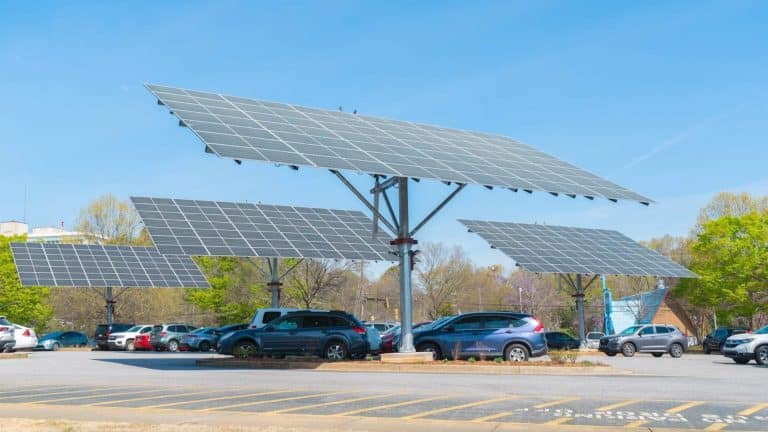One hundred years ago, the automobile disrupted human mobility, displacing horse-drawn transportation and the industries that supported it. Today, electric cars, trucks, and buses are poised to disrupt the transportation industry again, delivering mobility that is: better performing, cleaner, cheaper, and more energy secure.
At the request of the Florida Legislature, Florida recently released EV Infrastructure Master Plan (EVMP), which was developed through a broad transparent process administered by Florida DOT that engaged relevant stakeholders, including the Southern Alliance for Clean Energy (SACE) in a year-long effort. As funds begin to flow from the recently inked federal infrastructure bill and the EV market heats up, the EVMP provides policymakers a road map to prepare the state for an EV future.
Opportunity Meets Preparation in the Sunshine State
A recent survey found that, on average, automaker executives believe 52% of auto sales will be EV by 2030, in line with the Biden Administration’s goal and automaker’s stated commitments. This level of growth would deliver an economic boon for the Southeast. The bipartisan federal Infrastructure Investment and Jobs Act includes $30.7 billion in EV-eligible funds to help get us there, but the public and private sectors have a lot of additional work to do to prepare for that level of market penetration.
Florida’s public and private sectors have begun positioning the state for strong EV growth and Florida is the leading EV state in the Southeast. From July 2020 to July 2021, market momentum accelerated:
- Sales of EVs in the state jumped 53%, approaching 3% of all cars sold;
- EV charging station deployment grew 54%;
- Utility investment rose an astonishing 815%, not including Florida Power & Light’s recently-approved $205 million EV charging infrastructure investment as part of a rate case settlement;
- Government funding in Florida topped $100 million through a combination of state-controlled Volkswagen (VW) Settlement Funds and federal Low or No Emission Vehicle Program grants.
FLORIDA EV SALES SINCE 2019

Even with this momentum, getting from 3% to over 50% of new vehicles sold will be challenging. Florida’s EVMP contains analysis and strategies to help navigate the path ahead. Now, policymakers need to shift attention from planning to implementation.
To deliver the maximum economic, public health, and environmental benefits to Floridians, policymakers should set their sights on achieving the EVMP’s ‘Aggressive Growth Scenario.’ The EVMP identified critical needs to achieve aggressive growth–drive reductions in EV costs, achieve rapid technological improvements, and provide supportive policies and funding incentives. Success will require every EV market stakeholder, including state agencies, utilities, automakers, EV supply chain companies, fleet owners, state and local government, and fuel retailers, to do their part.
FLORIDA’S LIGHT-DUTY EV MARKET ADOPTION SCENARIOS (% OF REGISTERED VEHICLES)

Policymakers Should Accelerate, Not Constrain the Market
There is nothing to be gained by slowing down Florida’s EV transition. Every car, truck, and bus replaced by an electric version puts a better performing, cleaner, lower operating cost vehicle on the road. And because Florida imports 100% of its fossil gas and diesel, electrifying transportation shifts fuel dependency from price-volatile imported petroleum to cheaper in-state regulated electricity. Electrifying all the state’s cars, trucks, and buses would boost Florida’s economy by $12.5 billion annually.
Expenditures Retained in Florida vs. Lost, by Fuel Type (Billions $,2019)

Policymakers need to understand that the EV market is in a state of heightened innovation and is set to explode in the next two years. Automakers are pouring tens of billions of dollars into ramping up the production of electric sedans, SUVs, pickup trucks, and delivery vans. Electric transit, school bus, garbage, freight, and even fire truck manufacturers are doing the same.
As policymakers prepare for the 2022 legislative session, attention should be on the urgent policy and funding mechanisms needed to advance the priorities outlined in the EV Master Plan and advocated by stakeholders, including, but not limited to these five:
- Establish state-wide consumer and fleet EV adoption and charging station deployment goals.
- Engage public and private stakeholders to ensure state-wide EV infrastructure deployment is practical, accessible to all Floridians, and consistent with a competitive marketplace.
- Affirm the Public Service Commission’s authority and responsibility to guide utility charging infrastructure investments, incentives, and rate structures to enable EV market growth, encourage private sector investment, and deliver downward pressure on rates for all ratepayers.
- Leverage the $198 million in federal EV infrastructure funding coming to Florida over the next 5-years to help achieve charging infrastructure deployment goals.
- Position the state to compete for $2.5 billion in competitive federal EV infrastructure grants.
Floridians are Ready for Action
A recent consumer survey about attitudes towards electric cars found that 67% of Florida respondents favor EVs. And of respondents who reported planning to purchase a vehicle in the next five years, 43% said they are likely to buy an EV. Results like these should give policymakers comfort that Floridians will support efforts to accelerate the EV market.
The survey also found that the top two factors influencing Floridians’ likelihood of purchasing an EV were the availability of federal tax credit and more public charging stations. While the federal government works on tax incentives, Florida’s public and private EV stakeholders should double down on implementing the EVMP to support consumer and fleet electrification.
Now is the time for policymakers to put in place the policies and incentives that will engage the state’s investor-owned utilities, encourage private sector innovation and investment, support local governments’ electrification ambitions, and enable equitable consumer access to EV ownership. This is where the focus needs to be, anything else is a distraction from the mission at hand.
Electrify the South is a Southern Alliance for Clean Energy program that leverages research, advocacy, and outreach to promote renewable energy and accelerate the equitable transition to electric transportation throughout the Southeast. Visit ElectrifytheSouth.org to learn more and connect with us.




